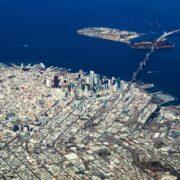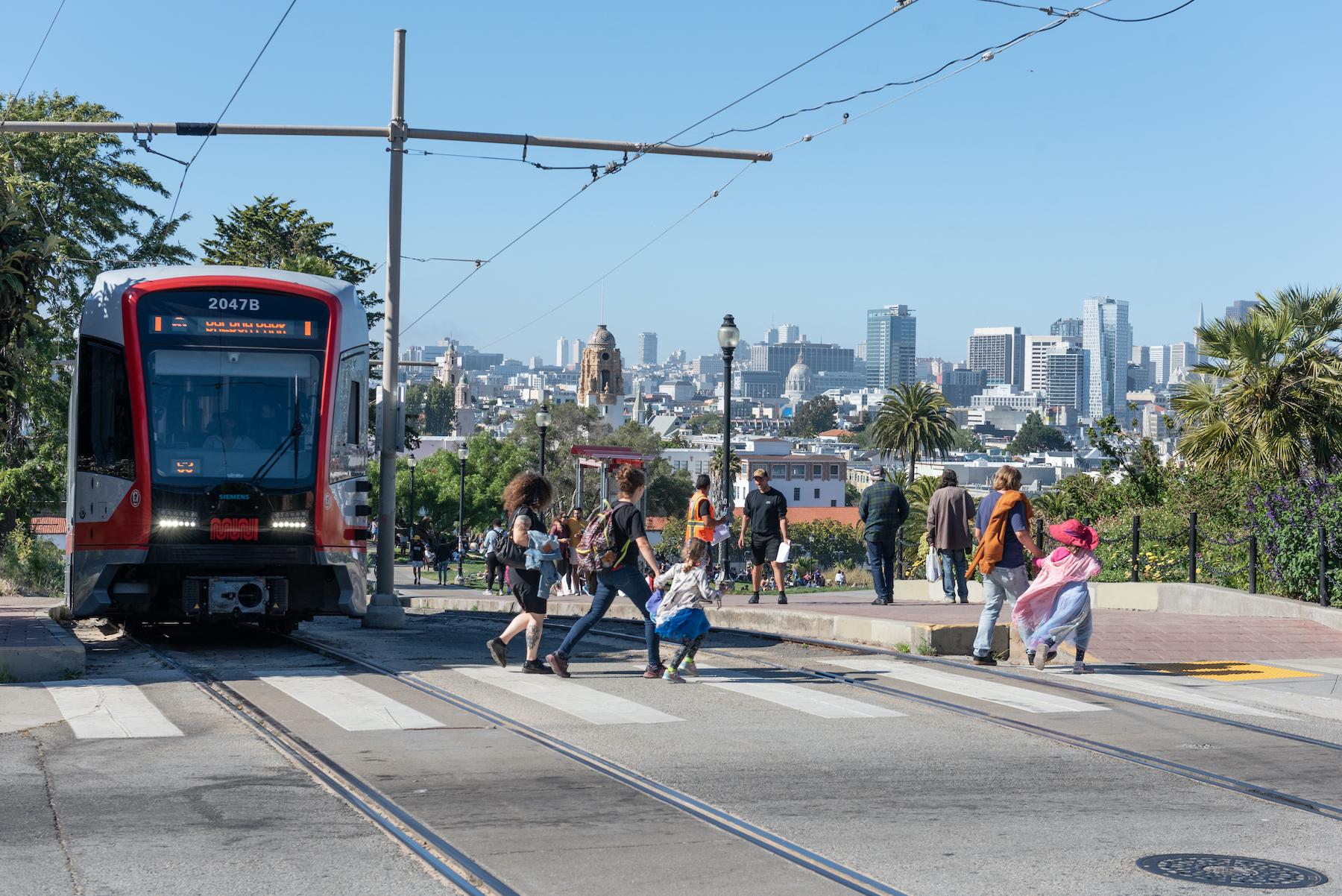Maceo May Apartments provides more than 100 units of affordable housing for formerly homeless veterans and their families
SAN FRANCISCO — On Thursday, May 18, Mayor London Breed joined city officials and community leaders to celebrate the grand opening of Maceo May Apartments, located at 55 Cravath Street on Treasure Island. Maceo May is the first residential and 100% affordable housing development to be completed as part of the redevelopment of Treasure Island.
Maceo May Apartments is a six-story modular structure that spans 104,500 square feet and includes 104 affordable units and one manager unit, ranging from studios to two-bedroom units. The building is dedicated to veterans and their families, some of whom are exiting homelessness and others who currently live on Treasure Island.
“Having lived on Treasure Island myself, I understand firsthand what this community means for residents already living here,” said Mayor London Breed. “We need to build more housing at different affordability levels in the city, and we need to build them now. The opening of this housing demonstrates the years of hard work by so many people who care deeply about this community and city, and shows us that if we work together, we can come up with bold ideas to create housing and communities for all San Franciscans.”
Maceo May Apartments is part of the environmentally sustainable new 21st-century neighborhood being constructed on Treasure Island and neighboring Yerba Buena Island for more than 18,000 residents. Upon completion, the redevelopment will feature 8,000 new homes, including about 2,200 affordable units; 300 acres of parks, trails and open space; new restaurants and shops; public art installations, and events.
“The opening of the Maceo May apartments is not only a huge milestone in the Treasure Island Redevelopment Project, but it’s also a symbol of our commitment to support those who have selflessly served our nation,” said District 6 Supervisor Matt Dorsey. “As we work toward meeting the city’s Housing Element by 2031, I’ll continue to prioritize affordable housing initiatives, so that all of our residents, including veterans, have a place to call home.”
Swords to Plowshares and Chinatown Community Development Center (Chinatown CDC) co-led the development of Maceo May Apartments in collaboration with One Treasure Island and Treasure Island Development Authority (TIDA). Treasure Island Community Development (TICD) is the principal developer responsible for the required utility improvements for the improved Treasure Island and massive infrastructure improvement, which include new roads, streets, and raising the Island to mitigate against sea level rise.
The building is named after Maceo May, a Vietnam War veteran who was the first Board President of One Treasure Island as well as Swords to Plowshares’ first Housing Director. May’s advocacy played a crucial role in ensuring homeless veterans would be recognized and served on Treasure Island.
The number of homeless veterans in San Francisco has decreased 45% since 2010 as a result of meaningful local and federal investments. The city’s last Point in Time count estimated around 600 veterans experiencing homelessness, a figure that has remained flat since 2019 amid the COVID-19 pandemic. However, the number of unsheltered veterans has decreased nearly 15% since 2019 thanks to ongoing collaboration between the Department of Veterans Affairs, the City of San Francisco, and Swords to Plowshares to quickly help veterans exit homelessness. Maceo May Apartments is the latest joint effort to make veteran homelessness rare, brief, and non-recurring.
“Maceo May Apartments is a historic step forward for Treasure Island and the City of San Francisco. It transforms a former military base into a restorative place for veterans,” said Michael Blecker, Executive Director at Swords to Plowshares. “It is a fitting tribute to its namesake, Swords to Plowshares’ first director of housing, Maceo May, who was a trailblazer for supportive housing. We couldn’t be prouder to serve these veterans alongside Chinatown CDC, the Mayor’s Office, and the many other supporters of this project.”
“Getting Maceo May to the finish line was not an easy task, but in the end, we were able to complete the project with the help of our partners who provided essential support,” said Malcolm Yeung, Executive Director at Chinatown CDC. “The most important partner was the community of veterans who repeatedly spoke in favor of this project. This project shows that where there’s a will, there’s a way, and our veterans certainly embodied that will.”
“Maceo May Apartments is the first new affordable housing development on Treasure Island which rightly serves those who have served their country,” said Sherry Williams, Executive Director of One Treasure Island. “This building represents just the beginning of the exciting growth of this equitable, diverse and thriving San Francisco neighborhood.”
Funding for the project included $39.2M from the Mayor’s Office of Housing and Community Development (MOHCD) and a $43.7M tax exempt construction loan from Silicon Valley Bank, a division of First Citizens Bank. Additional financing support comes from TIDA, the State of California Veterans Housing and Homelessness Prevention Program, Raymond James, Ally Bank, and the California Community Reinvestment Corporation. Operating subsidies are provided through the city’s Department of Homelessness and Supportive Housing’s Continuum of Care program and the U.S. Department of Housing and Urban Development’s Veterans Affairs Supportive Housing (VASH) program.
Designed by local architecture firm Mithun and constructed by general contractor Cahill Contractors, Maceo May Apartments feature a range of common areas, from gathering spaces to healing gardens, to serve a diverse population of veterans who have recently experienced homelessness and families with young children. The project is designed to meet GreenPoint Rated certification and incorporates several design elements guarding against disaster and climate change impacts, such as seismic events and sea-level rise, and prioritizes healthy and durable materials throughout. (SF Mayor’s Office Release)






